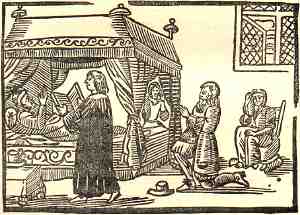How to treat a fever
Medicine was logical rather than practical, deductive rather than inductive. Fevers were hot and dry, so here is a logical way to treat them.
It is to be understood that all fevers of what kind soever they be. . . are through the inflammation of the blood, incivilly [unnaturally] much subject to drought. . . Wherefore, when any man is so overpressed with desire of drink, you shall give him at convenient times, either posset ale made with cold herbs [or spices, and curdled with warm milk]; as sorrel, purslane, violet leaves, lettuce, spinach, and such like, or else a julep. [A julep is a medicinal drink made of distilled water and sugar.]
For additional effectiveness the herbs would be given when a "cold" planet (Venus, Saturn) was predominant. Click here for more on cold herbs*, or here to read about some unexpected virtues of lettuce*.
Footnotes
-
Cold herbs
Herbs, like everything else, were categorized in terms of the four basic "qualities," hot, cold, dry and moist; all the herbs mentioned in this remedy were said to be cold--sorrel cold and dry in the first degree, purslane cold and moist in the third degree, etc. By the principle of antagonism, cold herbs were thought to counteract the heat of a fever. The careful housewife will grow:
Cold herbs in her garden for agues that burn,
That over-strong heat to good temper may turn
While endive and succory, with spinach enough,
All such with good pot-herbs should follow the plough.
(Thomas Tusser) -
The moral vegetable
John Evelyn wrote of lettuce:
[It] is indeed of nature more cold and moist than any [other vegetable]; yet less astringent, and so harmless that it may safely be eaten raw in fevers; for it allays heat, bridles choler, extinguishes thirst, excites appetite, kindly nourishes, and above all, represses vapours, conciliates sleep, mitigates pain; besides the effect it has upon morals, temperance and chastity.
Evelyn was a diarist of the late seventeenth century. His book of salads, Acetaria, was published in 1699.
